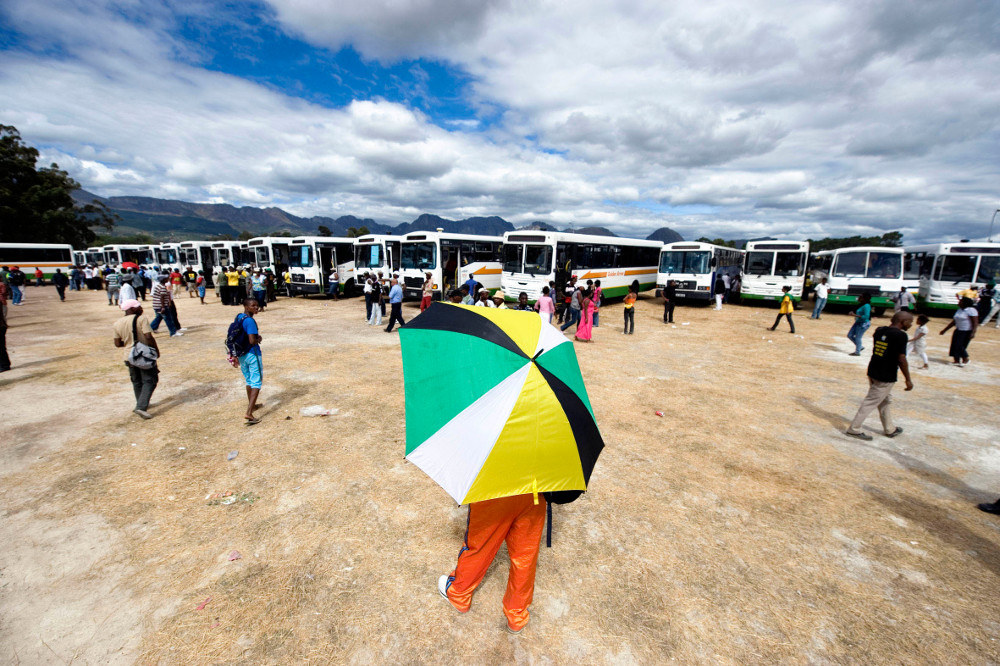Danny Jordaan is likely to be courted by the ANC to help it boost voter numbers.
A desperate ANC is looking to South Africa’s top soccer boss, Danny Jordaan, to help the party revive its fortunes and retain the fiercely contested Nelson Mandela Bay metropolitan municipality.
The party is battling to retain its popularity in urban areas, particularly in the metro municipalities that it governs. There are fears that opposition parties are gaining a foothold in towns and cities and could unseat the ruling party in some of them in next year’s local government elections.
Three senior ANC leaders told the Mail & Guardian this week serious lobbying was taking place in the party to get Jordaan appointed executive mayor of the Nelson Mandela Bay metro.
“We want to bring back a number of credible guys in the mayoral committee. The giants of PE [Port Elizabeth], with a mixture of the youth leadership, must come back and lead us. Danny Jordaan would be a good mayor. He will appeal to everyone.
“His name has been raised but we are [not] yet [ready] to approach him. It’s still a discussion,” an ANC Eastern Cape provincial executive committee member said.
Some ANC Nelson Mandela metro regional and provincial leaders are unhappy with current mayor Benson Fihla and would like to have Jordaan taking over the leadership with immediate effect, and then become the municipality’s mayoral candidate for next year’s poll. These members believe the 83-year-old mayor is too old to effectively engage with communities.
ANC president Jacob Zuma, his deputy, Cyril Ramaphosa, and the party secretary general, Gwede Mantashe, this week held an emergency meeting with the party’s Nelson Mandela Bay regional leaders in Port Elizabeth to discuss a strategy to assist the party in retaining the troubled metropolitan municipality.
The regional and provincial leaders expressed their wish for Jordaan to take over from Fihla at the meeting, but the matter has yet to be finalised.
Jordaan tops the list of proposed names the PEC shared with ANC officials, according to M&G sources.
The visit came a few days before the DA began its national conference in the city this weekend.
Jordaan could not be reached for comment.
Other leaders whose names have been suggested for the new mayoral committee include former deputy mayor Bix Ndoni, who served on the mayoral committee between 2002 and 2011, Mtwabo Ndude, who also served in the municipality’s mayoral committee, and a former ANC Youth League deputy president, Andile Lungisa.
Jordaan, known worldwide for his role in organising the 2010 World Cup, has been active in the ANC and chaired the party in Port Elizabeth before serving as its MP between 1994 and 1997. He founded the Port Elizabeth North Civic Organisation in the 1980s.
The ANC’s national working committee (NWC) report to last November’s national executive committee (NEC) meeting admitted that the Nelson Mandela region was “faced with serious challenges and the threat of the opposition gaining ground. The problems are more glaring at the level of the municipality,” the report said.
A rural party?
The M&G has also learnt that the ANC’s Gauteng provincial leadership is also discussing prominent names who could help the party recover from its poor showing in last year’s general elections in the Tshwane, Johannesburg and Ekurhuleni metros.
A provincial executive member said the discussions were still “at the initial stage”.
Last year’s general election results showed that the bulk of the ANC’s votes (64%) came from rural municipalities and small towns, and only 36% of the party’s 11-million votes came from the metros.
On the other hand, the official opposition party, the Democratic Alliance, increased its urban support, particularly in the big metros such as Tshwane and Johannesburg, and newcomer Economic Freedom Fighters (EFF) gained some votes that traditionally went to the ANC.
This has raised fears that the ANC is increasingly depending on the rural vote to stay in power.
Its support diminished in the country’s economic hub, Gauteng, where it received 54% of the votes in Johannesburg, 56% in Ekurhuleni and 51% in Tshwane. These were the lowest in the party’s 20-year rule, prompting the party to look deeper into the calibre of its deployees to municipalities.
In the Nelson Mandela Bay metro, the ANC received 48.81% of the votes in the 2014 national election, and the DA was second best with 40.8%.
Michael O’Donovan, an analyst at the Multilevel Government Initiative at the University of the Western Cape, said the 2014 elections showed there was a clear move towards the ANC relying on the rural electorate.
“A schism is forming between rural and urban areas,” he said. “While the party is losing support in urban areas, it is growing its support in the traditionally rural areas.”

The ANC is trying to rebuild its support base in the Nelson Mandela Bay metro. (Delwyn Verasamy, M&G)
O’Donovan said rural voters were more likely to be concerned about service delivery, and the party had shown the most obvious development of services in the rural areas.
But urban voters were more concerned about issues such as accountability and good governance, where the ANC was perceived to have failed, resulting in the continuing decline in its support, he said.
“Current voting patterns indicate that the ANC will cease to have majority support in metropolitan cities that do not have an attendant population in traditionally rural areas,” O’Donovan said.
But with more people moving to cities, this would fragment as different classes became distinct voting blocks in urban areas, he said.
Professor Joleen Steyn Kotze, a lecturer at the Nelson Mandela Metropolitan University lecturer and a research associate at the University of the Free State’s Centre for African Studies, said the ANC could be trying to bulk up its support among rural voters in preparation for the 2016 local government elections, and be looking ahead to 2019 because it was a little too late to deliver in the metros.
“An example is the eastern part of the Eastern Cape, which is really a strong ANC stronghold. The ANC gets between 70% and 90% of the votes there, and it is also the one area where the Democratic Alliance is only growing by 1% or 2%, which means their growth in those areas is not as big a threat to the ANC as it is in metros.”
Kotze said the trend of pleasing the rural voter was evident during the State of the Nation address.
“If one reflected back to the State of the Nation address, some of the key municipalities on water intervention, for example, were the Amathole municipality and there was another one in the Eastern Cape as well.
“So already from then one could see the idea was to earmark quite a lot of developmental money towards rural municipalities, and I think that is done with an aim to start building that narrative that ‘we have delivered; we have come to you and brought you these things you did not have’.”
But another political analyst, Kelvin Knowles, said the decline in support for the ANC was no longer confined to just the major metropolitan areas, it was also evident in rural areas, albeit minor.
Knowles said there were three main reasons for the decline in the Nelson Mandela Bay metro: “Prolonged infighting in the metro and political factionalism within the ANC centred around personalities. This impacts on service delivery in the metro, with especially Uitenhage and Despatch being severely neglected,” he said.
“[There is also] an inability to handle strife in PE’s northern areas, hereby further alienating marginalised communities and strengthening the DA’s gains,” Knowles said.
Too late for Mandela metro
Knowles said interventions by the ANC’s bigwigs were too little, too late, as the proverbial horse had already bolted.
“The ANC’s decline is also symptomatic of what is going on nationally within the organisation. The liberatory rhetoric still did not make way for the ANC to transform itself into a party that can rid itself of factions at national level and, of course, this is spilling down into provinces, right down to branch level.”
Service delivery protests have largely been limited to housing delivery disputes in Uitenhage. Last week, Human Settlements Minister Lindiwe Sisulu announced that the government would spend R4.6-billion over four years on building houses in the Nelson Mandela Bay metro.
She denied suggestions it was meant to appease the metro’s residents before next year’s election.
Zizi Kodwa, the ANC national spokesperson and NEC member, said this week that the Nelson Mandela Bay region would be discussed at next weekend’s NEC meeting, but he would not reveal the names of possible mayoral candidates.
“It would be premature to talk about leadership every time there are new names. We will not be guided by names discussed in informal structures. Ours is to make sure we accelerate service delivery. We are not near to a stage of appointing mayors,” he said.
The NEC would also discuss a technical report on the functionality of the metro.
“That technical report raises issues both on political and administration level. It is on the basis of that report that we are going back to Nelson Mandela Bay on May 18. We first wanted to present it to the NEC. Given the seriousness of the report, we felt it was important to take the national leadership into confidence,” Kodwa said.

The ANC launched its provincial election manifesto at the Dal Josafat Stadium outside Paarl in March. Community popularity is paramount in the choice of candidates. (David Harrison, M&G)
The ANC has been sending out signals that it is panicking about next year’s municipal elections. It said after its January 2014 lekgotla that it was planning to deploy former Cabinet ministers, deputy ministers, MECs, MPs and MPLs to local government to strengthen it.
The ANC’s head of communications, Keith Khoza, said the party would implement its resolution to deploy its best cadres to municipalities.
“We still remain committed to the decision. Local government is a catalyst in terms of service delivery. This is a principle that has been adopted. As we approach the local government election, we might see the implementation of that resolution. The names [of candidates] will be done in consultation with ANC structures. There will be guidelines about that,” he said.
The M&G reported last month that the ANC’s reviewed draft guidelines for selecting candidates for the 2016 local government elections stipulated that community popularity and a track record in political organisation be part of the key requirements.
The ANC’s NWC report last year said it had learnt from the election losses by its allies on the continent that the “youth and urban vote are the focus for recruitment and mobilisation” by opposition parties.
The ANC has also experienced loss of support among the students’ representative councils – a population group that will be first-time voters in next year’s municipal elections.
The most significant losses for the ANC-aligned South African Students Congress (Sasco) were at the University of Fort Hare in the Eastern Cape and at the University of Limpopo’s Turfloop campus, both traditional ANC strongholds.
The DA Student Organisation won 52.5% of the SRC elections at Fort Hare last month, yet Sasco managed only 37% of the vote, an outcome the ANC Eastern Cape spokesperson, Oscar Mabuyane, described as “disappointing” and “not an easy thing to accept”.
At the University of Limpopo, the ANC-aligned Progressive Youth Alliance, which consists of the ANC Youth League, the Young Communist League and Sasco, was unseated by the EFF Students Command. – Additional reporting by Mmanaledi Mataboge